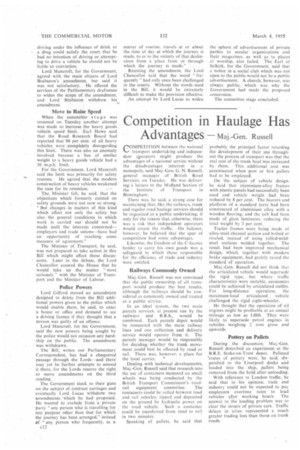Competition in Haulage Has
Page 50

If you've noticed an error in this article please click here to report it so we can fix it.
Advantages —Maj.-Gen. Russell rOMPETIT1ON between the national
transport undertaking and independent operators might produce the advantages of a national service without the disadvantages inherent in a monopoly, said Maj.-Gen_ G. N. Russell, general manager of British Road Services, on Tuesday. He was delivering a lecture to the Midland Section of the Institute of Transport in Birmingham.
There was, he said, a strong case for maintaining that, like the railways, trunk and regular road haulage services should be organized as a public undertaking, if only for the reason that., otherwise, there was a risk that independent operators would cream the traffic_ On balance, however, he believed that the spur of competition had some advantages.
Likewise, the freedom of the C-licence holder to carry his own goods was a safeguard to which those responsible for the efficiency of trade and industry were entitled.
Railways Commonly Owned
Maj.-Gen. Russell was not convinced that the public ownership of all transport would produce the best results, although the railways should be considered as commonly owned and treated as a public service.
In an ideal system, the two main parcels services, at present run by the railways and B.R.S., would be combined. Each parcels depot would be connected with the main railway lines and one collection and delivery service would operate from it. The parcels manager would be responsible for deciding whether the trunk movement could best be effected by road or rail. There was, however, a place for the local carrier.
Dealing with technical developments, Maj.-Gen. Russell said that research into the use of containers mounted on small wheels was being conducted by the British Transport Commission's roadrail equipment committee. The containers could be rolled between road and rail vehicles, tipped and deposited on the ground by hydraulic power on the road vehicle. Such a container could be transferred from road to rail in two. minutes.
Speaking of pallets, he said that probably the principal factor retarding the development of their use throughout the process of transport was that the real cost of the trunk haul was increased by them. This additional cost was accentuated when post or box pallets had to be employed.
On the subject of vehicle design, he said that aluminium-alloy frames with plastic panels had successfully been used and vehicle weight had been reduced by 8 per cent. The bearers and platform of a standard lorry had been constructed of aluminium alloy with a wooden flooring, and the cab had been made of glass laminates, reducing the total weight by 3 per cent.
Trailer frames were being made of alloy-steel channel section and bolted or riveted, instead of using rolled-mildsteel sections welded together_ The result had been improved mechanical design, which, together with modern brake equipment, had greatly raised the standard of operation.
Maj.-Gen. Russell did not think that the articulated vehicle would supersede the rigid type, but where traffic characteristics were suitable, economics could be achieved by articulated outfits. For long-distance operation, the maximum-load articulated vehicle challenged the rigid eight-wheeler.
He thought that the operation of oil engines might be profitable at an annual mileage as low as 5,000. They were likely to supersede petrol engines in vehicles weighing 2 tons gross and upwards.
Pottery on Pallets
During the discussion. Maj.-Gen. Russell described an experiment at the B.R.S. Stoke-on-Trent depot. Palleted `crates of pottery were, he said, dispatched to the Liverpool docks and loaded into the ship, pallets being removed from the hold after unloading.
With reference to London traffic, he said that in his opinion, trade and industry could not be expected to pay employees overtime rates to load vehicles after working hours. The answer to the loading problem was to clear the streets of private cars. Traffic delays in cities represented a much greater trading loss than those on trunk roads.












































































































